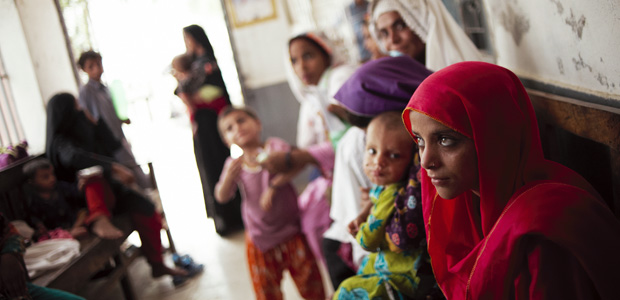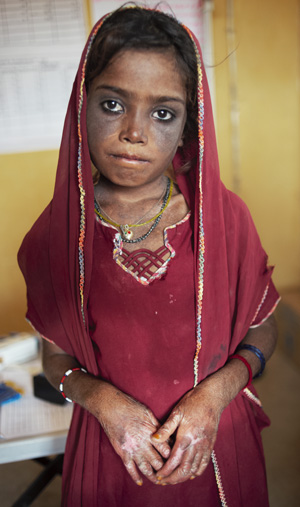Pakistan: praying for mercy from the floods, one year on
A year since the most devastating floods in Pakistan’s history, thousands of people are still struggling to rebuild their lives and malnutrition rates are critical. Shaista Aziz reports from Sindh.

Journalist and international aid worker Shaista Aziz writes from Pakistan where British charity Merlin delivers medical aid.
Pakistan’s poorest and most vulnerable in rural communities in Sindh live in fear of this year’s monsoon rains, terrified the floods will return and swallow up what little is left of their lives.
The floods have had a catastrophic impact on the health of the population and as always in disasters it’s the weakest and vulnerable that suffers the most; children, women and the elderly.
Sindh is the third largest Province and Pakistan’s breadbasket. Yet despite this, Sindh has some of the highest rates of malnutrition in Pakistan, highest rates of illiteracy and staggering levels of poverty.
A 2001 survey concluded malnutrition rates of 23.1 per cent in northern Sindh and 21.2 per cent in southern Sindh. The UN measures malnutrition as being a critical emergency if it reaches 15 per cent.
The levels of malnutrition in Sindh are higher than in some parts of Africa, including Darfur. The local department of health has identified critical levels of malnutrition in the province.
Vital healthcare
Asee Allah Bachaye, a 70-year-old grandmother, sits quietly in a health clinic run by British health charity Merlin in Basripo Jat, in the district of Dadu. The clinic is the only health facility for a population of nearly 26,000 people.
For many people in Basripo Jat, and the surrounding villages, this is the only opportunity they have to access healthcare.

Asee Allah Bachaye – whose name literally means Allah will save me – describes the impact last year’s floods have had on her life:
“I can’t breathe because I am in fear of the floods coming back. So many children were swept away in our village. Many women in the community lost their babies, and they miscarried due to the stress and fear.
“We lost all our livestock and our main way of making a living. We used to sell buffalo milk and live off the money we made from selling the milk”.
The frail old lady pauses and wipes sweat from her face using her duppata (scarf) and continues: “I’m here because I have a fever and my body is in pain. I feel exhausted and dizzy. My body hurts. We are poor people, our lives are hard. We only have roti (chappati) and dal to eat and sometime only roti. I’ve not seen fruit in years.”
The Basripo Jat clinic, outside Dadu, is heaving with women and children; almost 200 people attend the clinic every day, many malnourished, all of them exhausted.
People try the best they can to raise their children with next to no money and limited food.
Child malnutrition
An hour away from Basripo Jat, Merlin works in another remote village ensuring the community has access to healthcare.
Most people walk up to an hour to reach the clinic which provides for the 20,000 people living in the area. Children and women are treated for malnutrition by health workers and doctors.
A young father holds his 12-month-old son tenderly as he sleeps in his arms. “I have four children,” says Shaba Ismael, a 25-year-old labourer. He moves his son so that his face is visible and watches him sleep.
“Aslam is my youngest child and he was very weak and jaundiced. When I first came to this clinic the health workers told me that my son weighed 3kg. I’ve been bringing him here for the past few weeks and he now weighs 8kg.
“My son is happier and no longer cries as much. He is stronger and can sit up by himself. He’s much happier now,” says Shabab Ismael. As if on cue, baby Aslam breaks in to a smile as he sleeps.
Preparing for the worst
The Merlin nutrition clinic weighs children and pregnant women and charts their progress every two weeks.
Children and mothers are measured to see how much weight they are gaining as the nutrition supplements and vitamins Merlin supplies take effect. Children grab the nut supplements full of nutrients to help increase their weight and suck on the packets, their eyes alert and focused as they eat.
Women are given advice on nutrition and how to breastfeed. All of the services are offered in a friendly and safe environment where women feel comfortable.
Dr Ijaz Habib, Merlin’s nutrition specialist, has seen the impact of the flooding on health.
“People are hoping and praying the monsoon will show mercy on them this year as they are still picking up the pieces of their lives,” he says.
“What happened last year was like nothing anyone has seen before. Merlin are prepared for the floods, we have over seven months of medication stocked in our warehouse and are ready to mobilise our teams should we need.”
People in Sindh are extremely resilient and pragmatic. When you are poor and have lost possessions, and in many cases homes to floodwater, you have little choice.
Click here for a video about Merlin and visit the website www.merlin.org.uk for more.
